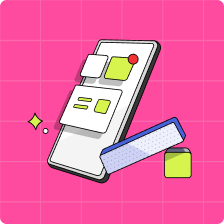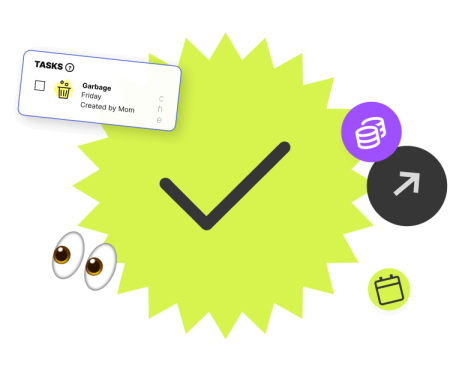It happens to every parent: At some point, your precious bundle of joy becomes a teen. And then, along with the deep sighs, eye rolls, and soul-crushing lack of tolerance for your jokes, they’ll likely be looking for a way to earn more than the allowance and Tooth Fairy deposits that once thrilled them as a kid.
That means they’re going to have to get a job.
Of course, teaching teens the next stage in money management will mean they need a bit more money to manage, and their first job can help them earn it.
Though it can be a bit of an emotional parenting roller-coaster, watching your teen land their first job can be exciting. Kids earning their own money aren’t just getting new work experience—they are also learning to make smarter spending decisions and develop key skills that will serve them well in whatever career path they choose.
Bonus: Biweekly paycheques can also mean less pressure on the parental wallet. Win-win!
But deciding they want to earn some extra cash and securing a job that will provide it are two different things. Helping teens bridge that gap is a great opportunity for parents and their kids to navigate some important questions together.
This guide will point you both in the right direction and offer some ideas for setting your kids up for success with the money, values, skills, and experiences to help you raise that self-sufficient, happy, responsible adult you’re hoping for.
When should my teenager get their first job?
A recent Harris Poll found that most parents think kids should get their first job around the age of 15. But age isn’t the only factor at play: Your child’s maturity level, interest in employment, and time-competing extracurriculars should also be taken into consideration.
Another thing to keep in mind is the teen labour laws of your province, as they vary across the country. Check out the rules for youth employment in your province.
Hints your teen is ready for their first job
At some point, your teen will be ready to start looking for work. The clues that your teen is ready to move on from you as their employer may be explicit (“You’re the worst boss ever, Mom!”) or implicit (finishing chores easily or skipping out altogether). Other signs that your kid is ready for their first job:
- Wanting to purchase a big-ticket item that is more want versus need
- Complaints that their allowance is too small
- A desire to have more autonomy over the way their money is spent
- The realization that peers pay their own way for outings and hoping to do the same
- Having a business idea they want to bring to fruition
Why is it important to get a job as a teenager?
Maybe you’re the one who’s decided it’s time for your kid to find a paying gig. Here are the top reasons you might want your teen to get job:
- It’s a chance for them to develop new skills
- You want them to learn that hard work and income go hand in hand
- It’s time for them to start their own savings for post-secondary education
- First jobs present a chance to be exposed to a chosen career path
- They need to improve their money management skills
- A work schedule will reduce their screen time during the summer
How parents can prepare teenagers for their first job
You might be surprised to learn what your kids think their first job will be like. (Hint: a corner office and an assistant are unlikely.) Help them manage expectations by sharing personal anecdotes from your working life and suggesting the best jobs for teenagers before starting their search.
Start at home
If your child is younger, their first job might be at home. From a very young age, kids can contribute to household chores and general upkeep. Adding an allowance method for specific tasks and beginning conversations around saving and spending can help them understand the value of money.
Tell them about your first job
Sharing your experiences and the emotions that came with your first job (being nervous at the start, making long-lasting friendships along the way, or finally mastering the fry cooker) might relieve some of the anxiety your teen is feeling. Be careful not to suggest that what you did for your first job is the only option available to them. Leave room for them to come up with options that best suit their personalities.
Remind them that it wasn’t your last job
For older kids, the pressure in high school to find a career can weigh heavily as they seek out their first jobs. Help them see the value any job can provide (learning what they’re good at, building friendships, and gaining new skill sets). Let them know that their first summer or part-time job isn’t the same thing as a career choice.
Think big, but aim small
Sometimes the job your kid is dreaming of for their future simply isn’t available to them (supreme court judge, for example, isn’t likely at 16). But seeking out a job in the same environment as their ultimate ambition (like a mail clerk at a law firm) offers a chance to see what that work might be like. Have a teen who thinks they’d love to be in tech? Teaching at a coding camp could give them a sense of whether they’d enjoy it.
Share the truth about paycheques
Talk about the realities of minimum wage, tax requirements, and working for tips. Knowing what they can expect to make will go a long way toward helping your teen narrow down the best job options and manage expectations about what they’ll earn and how long it will take to save for the new phone they’ve been coveting.
Read more: How to read and understand a pay stub.

7 ways parents can help their teenager get their first job
A teen’s first attempts to seek out employment can leave them frustrated and overwhelmed. The good news is that you can offer guidance without taking over. Here’s how you can help your kid get their first job:
1. Identify their motivation
Are they trying to build up a cache of gas money? Save for a car? Pitch in on some hockey equipment? Having a goal in place will keep them focused on their success.
2. Help them see themselves
A strong sense of identity will help kids figure out which job opportunities are the best fit. You can support them in identifying and listing key areas of interest.
- What do they like to do? Sports? Art? Music? Finding jobs that include elements of things they already enjoy will keep work interesting.
- What are their strengths and weaknesses? Realizing they are talented organizers but not morning people may suggest certain jobs (stockroom clerk) over others (coffee shop barista).
- What are skills they’d love to hone? Public speaking? Maintaining their athleticism? Maybe there are opportunities to get paid while they do so.
- What kind of environment do they thrive in? Help them understand whether they like rising to the challenge of competition or would excel in a more collegial space.
- How much time do they have to dedicate to a job? Teens need to explore whether they want a full-time gig or something that’s just a few hours a week. They should also take into account other activities they have on the go and if they’d need to give them up in order to work.
Based on your findings, you can help your teen brainstorm a list of potential jobs that will let them be their best selves.
3. Introduce them to the tools they’ll need
It takes time to get a resume and cover letter just right. If your teen isn’t sure what to include in their resume, this guide on how to write a resume (with examples) can help. Your teen may also want to include a personalized cover letter with their application.
4. Help them prepare for their first interview
Your teen might be asked to interview on the spot after asking for an application. You can help them prepare for their first interview by offering tips (don’t forget to make eye contact!), helping them rehearse their introductions and role-playing with common interview questions.
Teens should also have a few questions in their pocket that they can ask a potential boss if prompted. Finally, help them make a list of any important information (like the driving test that’s already booked and will require a day off) their employer should know about right away.
Read more about how to prepare for your first interview as a teenager
5. Share tips on workplace etiquette
Offer advice on how to be a good employee, like showing up early, dressing appropriately (peek at the company’s website for hints), proper online behaviour at work, and the importance of being courteous. Reputations will last longer than their summer employment, and building relationships they can rely on in the future can be quite valuable.
6. Release the reins
Getting their first job means your teen has a new boss to answer to, so your role needs to shift from saviour to supporter. Be a reliable listener—resisting the urge to provide solutions to their problems—and your child will feel like they have a safe person to turn to with their concerns. You’ll want to leave any actual negotiations around at-work issues to them to execute: This will help them build problem-solving and interpersonal skills.
Read more about teaching negotiation skills
7. Talk to them about safety
Be clear with your teen about the importance of a safe work environment. If they feel like the workplace is unsafe (physically or mentally), they should have your support in speaking up. Run through the scenario at home to help them feel comfortable enough to independently share their concerns with their boss or co-worker.
How to get a job without experience
Many teens face the challenge of seeking first-time employment without ever having worked before. Help ease their mind with advice and reassurance that it is, in fact, possible. Here are some ways they can achieve their goal:
Start the job search early
The job market could be fierce, and teens may find themselves in competition with much more qualified candidates. Encourage them to start applying early for seasonal work and be prepared to send out more than one application.
Lean on relationships
Networking may sound intimidating to some kids, but it’s really just about getting to know people. Encourage your teens to build genuine connections with people in their community that work in areas they care about. Help them find the right words to let those people know they are looking for employment by sharing networking tips.
Check in with places they’ve volunteered
These are places where their work ethic is already a proven entity—ditto for co-op placements they’ve completed or community organizations they frequent. There is no harm in asking if there are paid opportunities available.
Read more: What high school students need to know about volunteer opportunities.
Leverage the skills they already have
Were they reliable members of their baseball team? Did they show leadership skills on the yearbook committee? Teens should think about how those skills relate to the work they’re applying for, include them on their resume, and mention them in interviews.
How to help teens cope with job rejection
Being turned down is part of the job search process. Even after your teen has secured a job, things won’t always go as planned (probationary periods are there for a reason). For teens who aren’t used to job rejection, talking about it can be tough and managing the emotions around it tougher still.
This game plan can help you support your child while they navigate these hurdles.
- Acknowledge the pain of rejection. Not getting what we want isn’t fun. Feeling bad about it is normal and expected.
- Offer space to grieve. Back away from your instinct to smother your teen’s injured ego with non-stop banter. Instead, offer them time to think about it independently and resume the conversation when they say they’re ready.
- Review and reflect. Even bad jobs have learning opportunities. Prompt them to consider what they learned, what they wish they’d known before accepting this job, what they might have done differently, and if there were any red flags they missed during the application process.
- Encourage resilience. Finding another job won’t necessarily be easier than finding the first one, but your child is in a different position. They’ve done this before and survived. Reassure them of their capabilities.

The best jobs for teenagers
Some jobs just have “teenager” written all over them. These entry-level positions are often easiest to secure, offer some flexibility in terms of timing, and are ready to train the right candidates. Some even come with perks, like discounts, that may help offset other costs. Depending on your teen’s interests and talents, one of these options might be the perfect first job:
- Food service (dishwasher, server, busser, cashier, host, cook)
- Babysitting (note that taking a certified course or having your CPR training will help)
- Lawn service (lawn-cutting service or as part of a landscaping team)
- Retail associate (shelf stocker, cashier)
- Theme park worker (office staff, concessionaire)
- Camp counsellor (day or overnight camp)
- Sports staff (golf course caddy, tennis academy assistant, coaching assistant on a kids’ team, lifeguard, swim instructor)
- Community centre (program assistant, front desk clerk, maintenance staff)
- Events and entertainment (movie theatre usher, concert concession stand worker, ticket seller)
- Library assistant or clerk
- Long-term care staff (dining room assistant, cleaner)
Read more about the best summer jobs for teens and 14 best part-time jobs for teens.
Popular online jobs for teens
Remote schooling and online gaming mean that many teens are more comfortable online than their parents are. That’s a skill that can be put to use! Online jobs offer teens the option of working from home and more control over some of the anxiety-provoking factors of an on-site job. A few to consider:
- Tutoring services
- Data entry
- Website or social media management
- Customer service or telemarketing
- E-commerce enterprises (including starting their own business!)
Read more about how to make money online as a kid
Where teenagers can look for their first jobs
Job opportunities are everywhere once you know where to look. Sharing some ideas with your teen will get the ball rolling, and soon enough they’ll see them too. These resources can help get you started:
- Job boards at the places they frequent, such as coffee shops, and gaming and other stores
- Hiring signs in store windows
- Posters on utility poles asking for help with odd jobs
- Community spaces (seniors centres, community centres, daycares)
- Social media. Teens should feel empowered to ask for hiring info from accounts they follow.
- Government programs. Check back often to see available programs and opportunities.
- LinkedIn. Help your teen set up a profile and job search criteria. They’ll be notified if something is a potential match.
- School. Guidance counsellors and co-op teachers often have leads on community organizations that could use extra help.
- Friends. If someone your kid knows has a job they love, encourage them to ask how to apply.
Mydoh helps prepare your teenager for their first job with real-world experience
Earning money is only the first step in developing the skills necessary to become money smart. The next step is to help your teen understand its value and how to manage it best. That’s where Mydoh can help.
Mydoh is a money management app and Smart Cash Card made for families. The app’s features are geared toward helping them save and spend responsibly—skills that will prepare them for real-world earning while also leaving room for parents to support and encourage their growth.
Plus, with the app, parents and teens learn how to be better money managers. You don’t have to be a financial whiz or tech-savvy, just willing to learn—together.
Money mission accomplished
Once your kids are earning, they’re learning. Whether it’s how to manage a demanding boss or why bringing their lunch from home will get them to their saving target faster, they’ll be developing habits that will lead to important financial skills. Best of all, as their ally on the road to financial fitness, you’ll be helping them learn to navigate the world of work and providing the tools that will help them reap more from their own efforts.
Download the Mydoh app to help your teens gain real-world experience as they prepare for their first jobs.
This article offers general information only and is not intended as legal, financial or other professional advice. A professional advisor should be consulted regarding your specific situation. While the information presented is believed to be factual and current, its accuracy is not guaranteed and it should not be regarded as a complete analysis of the subjects discussed. All expressions of opinion reflect the judgment of the author(s) as of the date of publication and are subject to change. No endorsement of any third parties or their advice, opinions, information, products or services is expressly given or implied by Royal Bank of Canada or its affiliates.

















